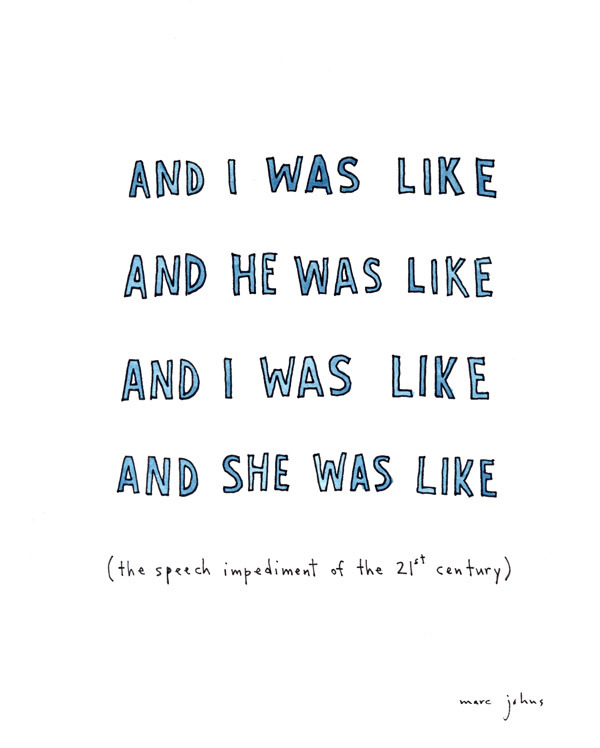the speech impediment of the 21st century (by Marc Johns)
I’ll fuck you up buddy this is not a speech impediment it’s linguistic evolution!! the existence of the phrase “Aisha was like” allows the speaker to convey whatever Aisha said without making the listener assume they’re quoting Aisha directly while still maintaining the FEELING of what Aisha said.
ie, Aisha said she didn’t want to go out with me VERSUS Aisha was like, “I’d rather kiss a Wookie”.
the addition of “XYZ was like” lets the speaker be more expressive and efficient and it is a totally valid method of communicating information!!
With the way language has evolved, this is one of the few ways I can even think of to express in casual conversation what someone said.
“So I said to Aisha,” is certainly used, but if you remove the “so,” which implies casual tone (“and” can be used in the same way), you get
“I said to Aisha,” which is really formal in most English dialects/variations. I don’t know about all, but in New England dialects, you sound like you’re reading aloud from a novel.
“I told Aisha,” is really only used when you continue to describe, not tell, what you told her. Ex: “I told Aisha that James was too punk for her” works while, “I told Aisha, ‘James is too punk for you’” crosses the line back into formalness of the “I said.”
Things like “I asked” or “I answered [with]” are similar levels of casual and efficient to the “So, I said [or say, as many conversations about the past take place in present tense anyway, as if the speaker is giving a play-by-play in the moment]” but are specific to only certain situations.
“I was like, ‘Marc Johns, what is your obsession with restoring archaic speech patterns and interfering with the natural progression of English from complex to efficient?’” envelopes all of these easily and is accessible and crisp, and allows for more variations on inflection than the others.
Of course, James is probably like, “I already fucking said that.” But eh, I tried adding on.
#linguistics #a.k.a. how I learned to stop worrying and love the evolution of the English language without being a discriminatory elitist jerk (via crystalandrock)
(via replacer)
